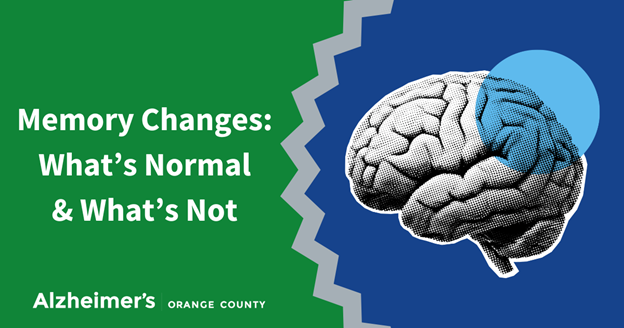Know the Signs. Act Early. Empower Yourself for Tomorrow.
Memory changes can feel scary, but they don’t always equal Alzheimer’s. Recognizing the difference and taking action early can make a big difference in the journey ahead.
What’s “Normal” vs. What’s a Warning Sign
Normal aging:
- Making a bad decision once in a while
- Missing a monthly payment
- Forgetting which day it is and remembering later
- Sometimes forgetting which word to use
- Losing things from time to time
Warning signs worth noting:
- Making poor judgements and decisions frequently
- Problems taking care of monthly bills
- Losing track of the date or time of year
- Trouble having conversations
- Misplacing things often and being unable to find them
These signs may point to Alzheimer’s disease, mild cognitive impairment (MCI), or another medical condition, something to watch for and discuss with your doctor.
Also remember that memory troubles may be caused by treatable conditions like medication side effects, vitamin deficiencies, depression, or other health issues, so it’s important to get checked.
To learn more about the warning signs of Alzheimer’s and other dementias, watch the video below.
Why Early Detection Matters
- Time to plan: care, finances, legal, and support systems
- Access to treatments that may slow symptom progression
- Ability to adopt lifestyle changes (diet, exercise, brain health) earlier
- Less stress for both the person and their care partner by navigating the path intentionally
- Opportunity to participate in research trials and contribute to knowledge
What to Do Next
- Talk to your doctor: Share your concerns and ask for a cognitive assessment. As a starting point, consider scheduling a memory screening offered by Alzheimer’s Orange County.
- Track changes over time: Keep a journal of symptoms, frequency, and progression.
- Ask for a referral: A neurologist, neuropsychologist, or memory specialist may help.
- Stay engaged: Continue social activities, hobbies, mental and physical exercise.
- Build your support team: Involve family, caregivers, friends. You don’t need to walk this path alone.
- Use reliable resources. Reach out to Alzheimer’s Orange County for guidance, answers and support through one of its many support groups, classes and/or other services that can provide the help that fits your family’s needs.
If you’re noticing signs in yourself or a loved one, you don’t have to wait and wonder. Early detection won’t stop the disease, but it gives you choices, voice, and direction.
You are not alone. Alzheimer’s Orange County is here to guide you through every step. Call our helpline at 844-373-4400 to speak to a dementia care specialist today.
Additional Reading
Memory, Forgetfulness, and Aging: What’s Normal and What’s Not?
Learn the difference between the normal changes in memory that come with age and something more serious. Read more here.
What is Mild Cognitive Impairment (MCI)?
Learn about Mild Cognitive Impairment (MCI), a less severe but important to know about form of cognitive decline. Read more here.
Cognitive Health And Older Adults
Find out about strategies to maintain your brain health. Read more here.


